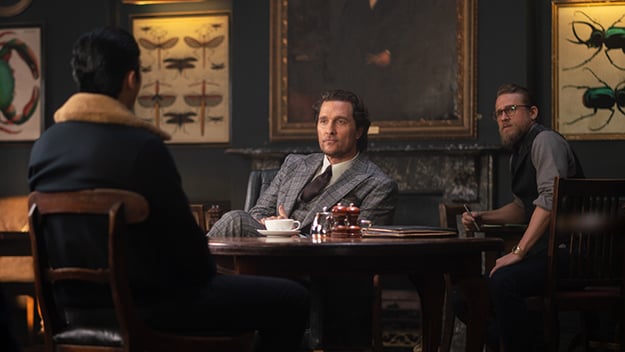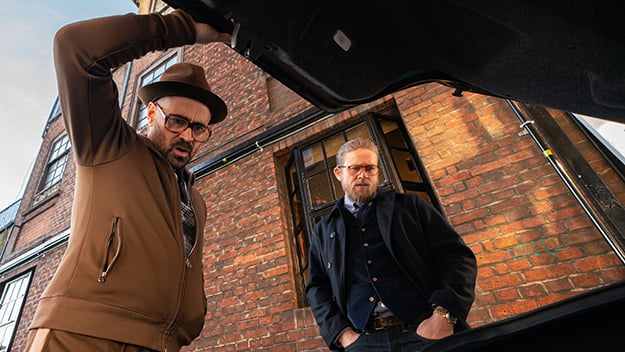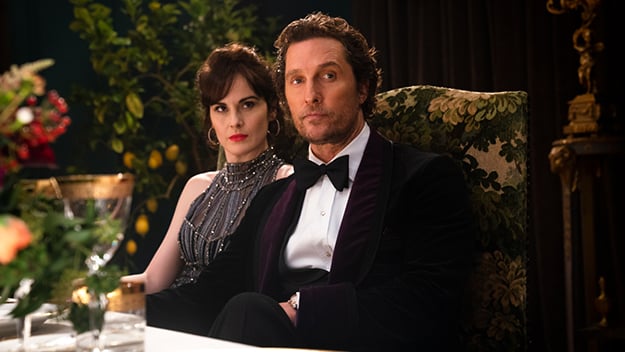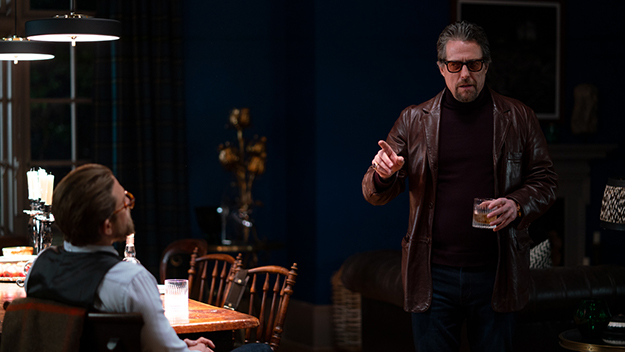Film of the Week: The Gentlemen

Images from The Gentlemen (Guy Ritchie, 2020)
Guy Ritchie’s new film The Gentlemen is highly instructive for students of the British class system. By “class,” I mean partly the still entrenched hierarchy that runs from the titled rich down to the proletariat—although within Ritchie’s own class system, each sector has its own hierarchy: the top level running from high-rolling toffs down to seedy cash-strapped aristos; the bottom tier from salt-of-the-earth-diamond-geezers to nasty little toerags. But dominating all of these different social tranches is the distinguishing notion of class in the sense of cool, as Ritchie defines it: that is, displaying a combination of swagger, no-nonsense machismo, and conspicuous elegant taste of the GQ magazine variety; observing a moral code within the conventions of movie criminality; and not being afraid to punish and humiliate your enemies when they’re bloody well asking for it. As Matthew McConaughey’s drug kingpin purrs in voiceover at the start of The Gentlemen, “If you wish to be the king of the jungle, it’s not enough to act like the king, you must be the king.” Oh yes, class also involves having a certain verbal flourish, a pompous prolixity: welcome to a world where men are men, money is money, and people actually talk like this.
Guy Ritchie is something of an embarrassment in the British film world: a director whom audiences are fond of and critics recoil at; someone who isn’t really that good at what he does but who nevertheless has succeeded in creating a signature brand, even if it’s a second-hand Tarantino-goes-to-Tottenham knockoff, proper London market forgery fare. He’s successfully used that brand as a passport to making lucrative, impersonal product (the Sherlock Holmes films, The Man From UNCLE, the live-action Aladdin). The Gentlemen, however, is clearly a labor of love, a bit of the old cheap-and-cheerful, returning to the immensely successful strain of his debut Lock, Stock and Two Smoking Barrels, which not only launched Ritchie’s own series of brash crime larks (Snatch, RocknRolla) but also spawned a whole British subgenre of bargain-bin gangland drama.
There’s a bit of return-to-roots street spirit in The Gentlemen—scenes in chip shops and boxing gyms, a rap routine with accompanying YouTube-style video for London grime artist Bugzy Malone—but as the title might suggest, Ritchie’s hard men have gone upmarket. In terms of Ritchie’s own leisurely approach here, the whole thing smacks of punk rockers getting fat and retiring to the country to start trout farms. The main gentleman in question is Mickey Pearson, tweed-clad American entrepreneur turned lord of the manor, played by McConaughey with a mean-eyed, laborious insouciance. Mickey made his entrée into the British drug scene by selling dope to posh boys in cricket whites while a student at Oxford, then cannily built an empire by installing cannabis farms on the estates of British gentry who can’t otherwise afford to maintain their stately homes. In the opening scene, Mickey saunters into a London pub, calls for a pint (the beer is Ritchie’s own bespoke brew, English Lore), and a pickled egg (they do exist but I’ve never known anyone who actually ate one), and then apparently gets shot.

The story that unfolds—or rather uncrumples, like a big greasy sheet of old newspaper that’s been used to wrap fried cod—involves Mickey’s empire being targeted by Matthew, an American money man (Jeremy Strong) and a ruthless young Chinese hood, Dry Eye (Henry Golding). Meanwhile, a blackmail plot is afoot, run by private detective Fletcher (Hugh Grant), minion of a sleazy tabloid editor (of the Daily Print, if you please), played by Eddie Marsan.
The novelty factor is that Ritchie has gone for a bit of the old cold-and-misty (Cockney rhyming slang for Agatha Christie, or should be) by staging Mickey’s shooting at the start and then having Fletcher narrate the events leading up to it. Not that there’s a whodunit flavor here, it’s more that the setup is as stiff and stagey as the Mistress of Mystery’s play The Mousetrap, which has run continuously in London since the reign of Henry VIII or thereabouts. The story proper starts when Raymond (Charlie Hunnam), Mickey’s shaggy-bearded sidekick, walks into a kitchen in a stiff tableau that feels exactly as if the curtain has gone up on some arty stage drama: you can only imagine that Ritchie has been watching the smart, caustic stage successes of Jez Butterworth and Martin McDonagh and fancying a bit of the same.
His characters don’t half talk a blue streak—they make Tarantino’s most incontinent windbags look as if they’ve walked out of Le Samourai. Mouthiest of all is Fletcher, who fancies himself not just as master narrator but as a moviemaker, showing Raymond his script for his dream project called Bush, which is and isn’t the movie we’re seeing. “I’m a storyteller,” says Fletcher, laying on the exposition. “As they say in the film world, I’m laying pipe.” And what a long, twisty, luridly painted pipe it is: describing two adversaries assessing each other’s strategic nous, Fletcher declares: “Now starts the alpha dance—they’re like a pair of doggies, sniffing round each other’s intellectual arseholes.”

Ritchie would probably describe the repartee, with a chuckle, as giving equal-opportunity offence. There are lavish amounts of racial abuse, which the films knowingly signals as PC-baiting banter. Characters are often defined specifically in terms of race—“Trust this Jew about that Jew,” says Mickey’s wife Ros, a Louboutin-wearing “Cockney Cleopatra,” about a rival of his, while said Jewish character has two bodyguards described as “MOSSAD CRABS,” in a big yellow caption scrawled on screen, Stars of David incorporated into the lettering. The same character also ends up literally paying Mickey a pound of flesh, in a grim twist on Shylock’s demand in The Merchant of Venice—a gloating doubling down on Shakespearean anti-Semitism.
The Chinese insults are solemnly antediluvian: Fletcher refers to Dry-Eye as a Chinese James Bond, “ricensed to kill” (sic), and there’s much weary play on an Asian character being called Phuc. As for the black characters, they’re strictly support, either muscle or—in the case of Bugzy Malone, as leader of a fighting rap crew—there to bring a spurious dash of urban street style. There’s also a shot, a sour excuse for a sight gag, of a group of immigrants huddling in the back of a shipping container: the single most contemptuous, compassionless image a film could possibly include as a wink at mock-realist currency. There’s undisguised loathing too for what the film calls “busy cunts”: yogurt-eating do-gooders and rural preservationists, middle-class Guardian-reading liberals—in short, the sort of people who wouldn’t like Guy Ritchie films.
Meanwhile, whoever has some vague moral code, or a natural grandeur, or is just more stylish than the rest, emerges as admirable: like Mickey, who imperiously silences his Chinese rival with a story about a dragon, because “I know you lot love fables,” or Ros, loftily unamused in the face of peril (Dockery plays it icy to the hilt, jettisoning her cut-glass Downton Abbey image for ruthlessly uninflected mean-girl froideur). Mickey’s dope business, of course, is seen as altogether benign, while Chinese gang boss Lord George runs an evil trade in hard drugs that cause the death of innocents. The film sneers at would-be toughs who are mouthy, clueless and callow, but grants almost regal status to the Irish boxing coach—just Coach, boisterously played by Colin Farrell—whose soberly observed code of criminal debt wins respect for him and his protégés (when the boys rough up Mickey’s guards, the latter profess only admiration for these sweatshirt samurai and their mentor). There’s also some cautious homophobia around the villains: Matthew displays purring femininity, while Fletcher’s camp repartee and flirtation with Raymond are presented as part and parcel of his creepiness.

With its story-within-a story structure and teasing inserts of incidents that happen and then don’t, this is a nearly passable impression of a clever movie: its little cinephile winks (“Smash cut please,” sprockets at the screen edge) try way too hard. But there’s the odd enjoyable moment, like Hunnam whipping out an unsuspected machine gun from under his raincoat, like a spring-loaded Acme Product in a Bugs Bunny cartoon. There are also a couple of those costume touches that are pretty much what constitutes character in Ritchie’s films: Fletcher’s cheap-looking brown leather jacket, Farrell’s ridiculous tartan tracksuit, and the incongruously cozy cardigan worn by a bear-like Hunnam. (There is no earthly explanation, however, for Strong’s battered hat, which makes him resemble the boffin Gyro Gearloose, an obscure bit-player in the Donald Duck Universe.)
There is, however, one very clever stroke of casting, and one plausible reason to see the film, and that is Hugh Grant. For one thing, it’s a nice touch—and no doubt a relishable bit of revenge—for the actor, a passionate campaigner against intrusion by the press, to play a creepy minion of Fleet Street at its most tarnished. For another, the one-time professional fop has reinvented himself magnificently in the last few years by expanding his range in middle age: sending himself up as a thespian narcissist in Paddington 2, playing a poignant but dignified also-ran in Stephen Frears’s Florence Foster Jenkins, and best of all, incarnating the former leader of Britain’s Liberal Party, Jeremy Thorpe, in Frears’s remarkable TV drama A Very English Scandal. Grant brings ample mischief to his part here, with a whiny delivery that suggests a pub impersonator doing Michael Caine, and bringing his own larky intonations to Fletcher’s exhibitionist pedantry. He’s top value and way better than the film deserves: that is class, and given how he almost redeems the film, you can’t begrudge Ritchie the luxury.
Jonathan Romney is a contributing editor to Film Comment and writes the Film of the Week column. He is a member of the London Film Critics Circle.







